
More of what made the first one so damn special
Always Sunset on Third Street 2 offers more of what made the first one so damn wholesome, at times much more bittersweet, it retains the goodwill and warmth of its predecessor. Still just as unabashedly nostalgic and touching, Always 2 is exceptionally self-indulgent, very saccharine and perhaps a bit overlong, but it's also an excellent example of an emotionally satisfying drama with likeable characters and a wonderful sense of place and time. One that doesn't fail to get the tears welling, making for a feel-good film with loads of laughs. Extremely refreshing and just the tonic in these austere and pessimistic times. It shines bright. Although you just know every Godzilla fan has seen the opening 2-minutes of this and then nothing further, a huge injustice if there ever was one. However, you can certainly see why Yamazaki was chosen to helm the latest outing for the Big G with this sequence... I can't wait.Was this review helpful to you?

She shoots, but does she score?
She shoots, but does she score? Well, between the copious amounts of histrionic, clichéd melodrama with scenes that go on for way too long, She Shoots Straight provides some genuinely uproarious and well-done action that wouldn't be out of place this side of Michelle Yeoh. Corey Yuen certainly brings variety to the film's kinetic style, particular standouts being a shootout shot in infrared and the storming of a ship with every manner of melee weapon imaginable, Yuen understands when to add a dramatic weight to make a true impact. Complimented by a decent if cheesy score by Lowell Lo, while the performances of Joyce Godenzi and Carina Lau balance out the deranged villainous antics of Yuen Wah. She Shoots Straight isn't bad by any means but the story doesn't make me really care about any of its sapy soap opera characters beyond a surface level while the action is too few and far between but finally delivers that explosive Hong Kong finale that you wait the whole film for, it just really needed some spicing up during the sluggish first half.Also, Joyce Godenzi should have totally lost that final fight against Agnes Aurelio.
Was this review helpful to you?

Watch the HK Cut
The answer is Jackie Chan. Who Am I? sees Jackie tackle the amnesiac spy thriller years before the Matt Damon shaky cam series and although a lot of the acting from its supporting cast leaves a lot to be desired (almost to the point of brain dead), the action more than makes up for it. The story feels unnecessarily complex and often messy but makes for an otherwise very compelling mystery (provided you watch the right version) in one of Jackie's more serious turns ala Crime Story. Benny Chan's direction is all pretty solid and Nathan Wang's score is decent if very dated, but seeing it paired with Jackie running around causing mass destruction in the Netherlands all while clad in a pair of clogs was truly a sight to behold. Despite a tepid first half, the film picks up steam with some great action, a fantastic car chase and the usual death-defying stunts in the second, with the rooftop fight easily ranking as one of his best, it's all just as imaginative and energetic as his early works even with Chan's advancing age.Was this review helpful to you?

Overly sexed cheese
Even with its mean-spirited streak, Body Weapon is a rather daring psychological thriller that combines the twisted sexuality and flamboyant savagery of Naked Killer with the physical masterstrokes of Jackie Chan in high gear. It's a relatively infamous Category III movie, but despite its status as one, it rarely goes above what one would expect from a sleazy exploitation film based solely on its gimmicky title. Between the tonally confused yet hilariously cheesy jokes, plodding sentimentality and overly sexed-up gimp-suited villain, Body Weapon offers up a tantalising amphetamine rush of brutal martial arts and steamy eroticism that impacts the senses with delirious intensity.Was this review helpful to you?
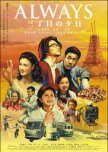
Lavishly heartwarming
Takashi Yamazaki's lavish screen adaptation of Ryōhei Saigan's immensely popular manga, Always Sunset on Third Street is unashamedly sentimental, a glossy, big-budgeted soap opera remaining captivating in its swoon of admiration for the period it is portraying. It's not intended as a serious examination of the tribulations faced by post-war Japan, though hints are thrown in now and again, instead, it focuses on the daily lives of its larger-than-life characters. Although it sometimes feels episodic, the cornerstone of this movie's success lies in its charming essence, lovable performances and overall warmth, sweeping the viewer along with its energy, tugging at the heartstrings every step of the way.Was this review helpful to you?

Exceptionally charming adventure film
Drawing heavily from kids' adventure films, ergo The Goonies just minus the gritty edge of the 80s and early Spielberg, Juvenile marks the directorial debut of one Takashi Yamazaki. He weaves together an engaging coming-of-age story primarily following the child characters and invoking a sense of imagination many kids partook in during the early years of their lives, retaining an old-school sci-fi charm along the way. It all feels genuine and is helped by the performances of its cast, although it does struggle to make many of the relationships organic. Its musical score by Yasuaki Shimizu is pleasant on the ears, with a beautiful theme to close the film the visual effects however, are more of a mixed bag. The CGI has aged horribly as was par for the course in Japan during this period but the practical effects work is fantastic, especially Tetra who is freaking adorable. Despite its faults, Juvenile is a competently made movie and an exceptionally charming one at that, capturing that feeling of childhood nostalgia with relative ease, Yamazai had a lot to offer and Juvenile was the first stepping stone to that success.Was this review helpful to you?

A bold if messy ghost story
Diving deep into the emotional longevity of what grief can inflict on an individual, Missing does not feel like a Tsui Hark film, as it's so far removed from his style. Mixing traditional supernatural beliefs with a psychological character study, Hark spins a tangled, often confusing web that while laudable doesn't quite sustain his ambitions. It instead offers a hodge-podge of genres ranging from psychological ghostly horrors to melodramatic romance, the very idea of the film is exciting but it has too many ingredients that ultimately leave it as a very messy piece of work, often looking hurriedly shot and put together almost as if it was made in a mad rush of a creative spark. It drags its feet to a rather unsatisfactory conclusion of multiple endings, feeling way longer than its advertised 2-hour runtime. Thankfully in the years, Hark's direction has remained steadfast and enjoyable, backed up by a passable score by Ricky Ho, Missing ultimately just misses the mark for me in its attempt to try so much, though the effort involved is commendable, the results are not.Was this review helpful to you?
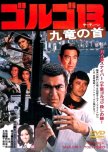
Another banger of an adaptation
Going into Assignment Kowloon, I was half expecting to see a campy 70s chop-socky interpretation which capitalised more on the success and fame of Sonny Chiba to earn a quick buck. But as it turns out, this is not only a damn fine representation of its source material but a damn fine movie in its own right. Golgo 13 seemingly had two of the best pieces of castings regarding live-action because Sonny Chiba is as much a dead-ringer as Ken Takakura was just for different reasons. Chiba's Golgo is much less human than Takakura's with a stone-faced expression that never leaves his face but makes exceptional use of his skills as a martial artist and stunt performer in some very grounded fight sequences and impressively daring stunt work. Director Yukio Noda makes excellent use of the film's variety of locations, from Hong Kong to Miami back to Japan, and although the film does stutter at first (most notably with some poor editing) it quickly finds its feet and maintains a very stylish atmosphere that simply oozes coolness throughout.Was this review helpful to you?

A perfect companion to Oppenheimer
The Man Who Stole the Sun treads the finest of lines in trying to balance its subject matter and tone, but Kazuhiko Hasegawa's controversial movie about nuclear terrorism is a darkly comedic and thrilling satire on a subject once considered unsatiriseable annihilating any form of genre borders in the process. Holding particular resonance for Japanese audiences, as while the country does use nuclear power, it has long held against amassing a nuclear arsenal due to the devastating effects that ended World War II. The movie doesn't stop dead for any form of long-winded nationalistic or philosophical speeches and instead insists on a conceivable reality with seemingly no motivation.One of only two movies directed by Kazuhiko Hasegawa, which in turn feels like a crime in itself, Hasegawa rewards the viewer with some utterly sublime direction and excellent framing, with plenty of thrilling action set pieces to command his viewer's attention at all times (the car chase feels like it was ripped right out of a Ringo Lam movie). It balances the unorthodox nature and tone of the movie exceptionally well, juxtaposing the shifts with unnatural ease. Complimented by funky and often ill-fitting music by Takayuki Inoue to glorious success.
The performances are all excellent, with Kenji Sawada playing the everyman gone rogue with an endless amount of animosity slowly succumbing to the effects of radiation poisoning making him more and more unpredictable as the movie goes on. But it's the award-winning performance from the stoic and hardened Bunta Sugawara that really captivates me as he normally does in his roles, single-minded and exceptionally driven.
Overall, The Man Who Stole the Sun, even at two and a half hours long, never feels overly long or bloated. The film absolutely refuses to limit itself, and that's why it's so entertaining and impressive.
Was this review helpful to you?

A recently rediscovered gem
Junya Satō's Golgo 13 is a much more human and melancholy adaptation of the source material, it loses the seemingly superhuman aspects of his anime counterpart. Making gorgeous use of a pre-revolution Iran, a decidedly off-the-wall idea even for the time and one that gives it a unique flavour, sees a perfectly cast Ken Takakura in the title role radiate with an ice-cold countenance matched only by his deadly skills and irresistibility to women. Oozing with menace and masculine suave, Golgo 13 trudges across desert landscapes, a man on a mission, decidedly anti-heroic but brilliantly realised encountering kaleidoscopic villains along the way. Excellently shot and choreographed action, striking editing and a classic slice of Toei-style orchestration for its soundtrack give Junya Satō's Golgo 13 a decidedly Spaghetti Western tinge. I can't thank Eureka Entertainment enough for finally giving this movie the attention it so justly deserves.Was this review helpful to you?
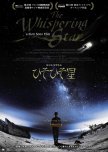
A combination of Kubrick, Tarkovsky and Akerman
I didn't know what to expect from my first Sion Sono movie, so when The Whispering Star ended up as what I can only describe as Stanley Kubrick meets Andrei Tarkovsky I was certainly surprised. Its narrative is almost wholly visual with minimal dialogue, often spoken in hushed and reverential whispers, expecting the audience to fill in the gaps with the limited information they've been given. Despite the clunky and unoriginal outlook of society and nature, it's the way the film is presented to you that makes all the difference, the black & white photography of the seemingly abandoned Fukushima Prefecture is gorgeous, with one scene of colour feeling beautifully alien to the rest of the movie. The long periods of reflective silence allow the audience and character to ponder on their meaning and place in the universe. While at times feeling akin to that of an arthouse production, for what it's worth, your patience will be rewarded if you can make it to the end.Was this review helpful to you?

What is it that we protect? The life and assets of our people?
With a title that literally translates to Japan Sinks, you'd be hardly surprised that the film eventually delivers on this title. The first of many adaptations of Sakyo Komatsu's original works, Submersion of Japan stands above most disaster movies by approaching an honestly terrifying situation with calm intelligence and asking many difficult questions along the way.Racked by earthquakes and volcanoes, Japan is slowly sinking into the sea. A race against time and tide begins as the scientists work together to salvage some fraction of the disappearing Japan.
Following an unsuccessful deal with Daiei, the film rights for the novel were sold to Toho, and those rights extended to the production of a television series, which would be filmed alongside the movie and shared some of the same cast as a result. A series I plan to get to one day if I can ever find working subtitles for. It would be the first big adaptation of the book with a film remake and parody both being released in 2006, two live-action television series and an anime to boot.
With a screenplay written by Shinobu Hashimoto, a frequent Kurosawa collaborator and substantial input from the original author, Submersion of Japan tells its story from a variety of differing viewpoints from a scientist to a submarine operator to the Prime Minster himself. Like the later released Prophecies of Nostradamus, it's not all doom and gloom despite the subject matter, there is some semblance of hope sprinkled throughout. It's not a film written from the perspective of the common citizen, more so the higher-ups in trying to organise impossible tasks.
It tackles many real-life issues that could we as a species could face in our lifetime, subjects such as the reaction of countries trying to accept a mass migration of an entire nation, the fears and anxieties of the nation's people being forced to leave their homeland behind and how it affects them etc. It's a very different type of disaster film that we are used to today, where in those disaster sequences usually play second fiddle to the story at hand.
This is my first exposure to director Shirô Moritani, and hopefully not the last, and he honestly delivers some utterly beautiful direction, especially for a film of this genre. With long sweeping landscape shots coupled with some brilliantly filmed scenes of characters simply talking, it's a pretty substantial film hardly letting up the intensity of the subject matter thanks in part to the commitment of its cast. The usual cast of Toho and Toei regulars make their appearances known, you may not remember all their names by the end but you'll for sure remember their characteristics. Be it the OG Kamen Rider actor Hiroshi Fujioka or others such as Tetsurō Tamba, Keiju Kobayashi and Shôgo Shimada, every single actor delivers an excellent performance.
Released the same year as the 13th entry in the Godzilla series, Godzilla vs. Megalon, it's very clear which one of the two benefits from an actual budget. When it comes down to it, Submersion of Japan puts that money front and centre allowing the creative roots of effects director Teruyoshi Nakano to absolutely shine. Coupled with extra input from eventual Return of Godzilla director, Koji Hashimoto, the film's disaster set pieces are truly a sight to behold, especially that of the Tokyo earthquake sequence which is horror incarnate. No wonder a lot of the footage would be used by later Toho SFX movies.
This is easily the best musical score I've heard from Masaru Sato, it's dark, brooding and equal parts intense, rarely letting up to drive home that feeling of hopelessness experienced by the characters. I've not been a massive fan of his works over the past few films I've seen he's contributed to, but at long last, I've found one of his contributions that I really like.
Overall, while I can see why people rate this one so highly, I find it way too invested in many of its long and very drawn-out situations of characters talking to give it anything higher than 4 stars. Nonetheless, it's still a glorious film from start to finish and should definitely be experienced by any fan of the tokusatsu or the disaster genre.
Was this review helpful to you?
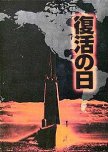
A weapon that would never be used by a rational man
I've been looking forward to watching Virus for a long time, a bleak downward spiral of a film that's less focused on solving the crisis at hand but more focused on survival for the sake of it even though there's no real reason to anymore.A US military-engineered virus, released during a plane crash, kills almost the entire human population. The only survivors are scientists and military personnel in Antarctica, who desperately try to find a cure and save what is left of the human population from further destruction.
Virus, or as it's known in its uncut form Day of Resurrection, is probably one of the best efforts by the Japanese to break into the US market where the Japanese didn't have to make any form of compromises to their filmmaking in order to appease the US. Despite not making the impact wanted at the US box office due to it being given a limited release, Virus still holds a lot of impact even to this day and honestly, is generally terrifying after having witnessed the world go through the COVID-19 pandemic.
Based on the book by Sakyo Komatsu, yes the guy behind the likes of Submersion of Japan, ESPY and Tokyo Blackout, and one of the few of his original works that's even available in English to a degree. At the time of writing this review, I haven't read the original book but I do plan to down the line, Virus is very typical of Komatsu's works with his greater focus on humanity than the disaster. While Virus is mainly based on Komatsu's original text, the film's screenplay benefits from additions by Kōji Takada, the seemingly unknown and one-time writer Gregory Knapp and director Kinji Fukasaku. It's a fantastically written dive into humanity with Fukasaku's typical perfectionist stance giving all his characters life and to an extent the virus itself.
Speaking of Fukasaku, he doesn't compromise his directorial style when switching over to a language he doesn't fully understand as would be worrying with a film of this nature. For a man mostly known for directing yakuza movies and Battle Royale, Virus brings across all the melancholy and drama you'd expect from his films and made all the more beautiful thanks to utterly gorgeous cinematography from Daisaku Kimura. Fukasaku doesn't skimp on showing us the horrific nature of a pandemic of this magnitude, mass death and destruction on a global scale, skeletons littering uninhabited cities, riots breaking out worldwide and piles of corpses being incinerated that evoke uncomfortable reminders of days gone by. Being the biggest-budgeted Japanese film of its time, it has clearly put to full effect.
The full-star cast only adds to the gravitas of the film's excellence, featuring the likes of US actors such as Glenn Ford, Robert Vaughn, Henry Silva, Chuck Connors, George Kennedy and Bo Svenson. Considering they are under the direction of a man who doesn't even speak their native language, they all perform admirably. On the Japanese side of the cast, we have the likes of Masao Kusakari whose English can be admittedly wonky at times but the effort he puts in more than makes up for it, Isao Natsuyagi, Tsunehiko Watase, Kensaku Morita and even Toshiyuki Nagashima.
Further adding to this movie's list of strengths is the incredible musical score by Teo Macero and frequent anime composer Kentarō Haneda. Employing the efforts of the London Philharmonic Orchestra, the score is simply wonderful, while it hasn't been strictly released in a large capacity there are albums floating around out there if you desire to listen to these pieces isolated like myself. The piece that opens the movie "Adieu Mon Amor" is beautiful but the entire score is worth a listen on its own.
While the film failed to take off even in Japan, make Kadokawa the Hollywood player they wanted to be or get Kinji Fukasaku the worldwide acclaim he deserved, in its full uncut version, Virus is a surprisingly powerful, criminally underrated and compelling end-of-the-world drama worthy of your attention if you like a bit more meat on the bones of a Hollywood disaster flick.
Was this review helpful to you?
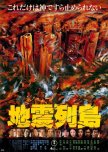
At least we'll die together, they way it should be.
Magnitude 7.9 is another little-known Toho disaster film born from the same veins as the likes of Submersion of Japan and Tokyo Gulf Burns. I'm a bigger fan of the US title of the film, Deathquake, although the UK release titled Megaforce 7.9 does get a chuckle out of me, sounding like an extension of the Power Rangers series. Regardless, what Magnitude 7.9 does offer is what I've come to expect from these styles of films, lots of engaging character drama and stunning destruction.When Seismologist Hoichi predicts that there will be an earthquake in Tokyo of greater magnitude than the one in 1923, which his father predicted, he is ostracised by his co-workers, family and friends; eventually, he starts seeing another woman, who already has a boyfriend. Hoichi's wife wants to meet her before she will grant a divorce but when the earthquake he so predicted strikes, it becomes a true test of both character and will to survive.
This is seemingly the only big-budgeted film from director Kenjirô Ohmori outside of some drama he directed 7 years prior which I doubt anyone has heard of. It's a serviceable effort from the man, capturing what he needs and knowing what to use. There's a great use of lighting, shadows and angles throughout, Kenjirô offers enough that it keeps the viewer invested throughout the first half before taking a 180 and going balls to the wall in the second.
A lot of what makes these films worthwhile is being able to get engaged with all the human drama going on and thankfully due to the efforts of Kaneto Shindō, yes THAT Kaneto Shindō, it's a lovely look at what happens when a person's belief in something is pushed to the max and how it affects the people around them. There's still time to focus on both the higher-ups and the common folk, but not to the same extent that it was explored in the later Tokyo Blackout, however unlike that film which thrust the disaster pretty much from the outset, Magnitude 7.9 takes about 66-minutes to get to it's advertised disaster.
Speaking of the destruction, there is about 20 minutes worth of equally gorgeous and utterly horrifying set pieces courtesy of the king that is Teruyoshi Nakano. While it's not his best work it does bring to life so many situations that would not be the best-case scenario to be caught in, especially that of riding an underground train at the time of the earthquake striking or landing in a 747 as the earthquake tears apart the runway. Of course, there are a couple of reused sequences from the likes of both Submersion of Japan and the banned Prophecies of Nostradamus but even then they are reduced to only a few shots so they don't make themselves that known unless you know to look for them.
While I praised the character work earlier, what Magnitude 7.9 fails to capture is any form of attachment to a lot of our everyday protagonists. The acting isn't bad, again serviceable but you'd be expecting Toho to try and rope in a few more familiar faces than what we got. The likes of both Hiroshi Katsuno and Yoshio Inaba are welcome presences as are Eiji Okada and Toshiyuki Nagashima and all deliver sound performances but nothing that really stands out that much in the grand scheme of this genre. There are a lot of cute father and son moments that really touched my heart with them seemingly reconnecting over the father's ousting and their little embraces really got the tears going at points.
The only other major critique I have is with the music composed by Toshiaki Tsushima. It's not a bad score but the music placement is all over the place, cutting out when there would be music and overwhelming the visuals when there shouldn't be any. It all feels a bit mistimed and mismatched. It's not one I'll desperately seek out to listen to again.
Overall, I'd find it hard to recommend Magnitude 7.9 to someone who wasn't that invested in exploring the realms of Japanese disaster films, it's a perfectly fine movie don't get me wrong, but a lot of the elements in certain areas have been done better by others. It's worth it all for the destruction sequences alone though.
Was this review helpful to you?
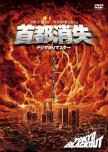
You don't know how to forgive yourself
Chances are most of you reading this have never heard of this film before today. It's odd being only the second person on here to review it equally so but I shall do my very best to convey my thoughts to you all. Fear. A primal instinct we as humans all share. Fear of the unknown, fear of the unexplained, fear of anything different to the norm and Tokyo Blackout exploits those fears to the max.A dome-shaped electromagnetic cloud suddenly covers Tokyo. The city becomes totally blocked and isolated from the rest of the world. With the temperature inside the cloud slowly increasing, the Soviet Pacific fleet getting closer and the U.S. forcing Japan to form a new government to help stabilise the situation. Scientists and research workers outside Tokyo must race against time to find out how to get through the cloud, rescue the 2 million lives and the country's fate all before the residents of Tokyo boil alive.
Equal parts Cold War thriller and natural disaster piece, it's another product of the insane imagination of Sakyo Komatsu—the same mind who brought us the likes of Japan Sinks and ESPY. Tokyo Blackout asks the difficult questions about the prospect of never seeing an entire capital city again, how the country would respond, how would its people react and what on earth can we do to possibly return to a sense of normality.
The multitude of plotlines keeps the viewer invested in one way or another. Be it the political outcry from the higher-ups trying to retain some form of order while the government has become unreachable, the ever-mysterious threat of the cloud baffling the scientists at every turn, or the more down-to-earth everyman stories of people simply missing their families and trying everything they can to return to them.
There's a lot here for everyone and anyone and I loved every second of it. Especially a beautiful little personal moment of calm stillness as two friends share a drink over the prospects of never seeing their families again, one barely holding her drink and the other downing it in one, two very different upbringings yet extremely touching as they both recognise each other's faults and guilts through the simple act of sharing a drink.
Directed by Toshio Masuda, a name known to me for a multitude of reasons, be it Tora! Tora! Tora!, Space Battleship Yamato or Prophecies of Nostradamus. You know he's going to deliver a visually striking film and while Tokyo Blackout is one of his more understated pieces it still carries with it some incredible imagery and excellent visual storytelling across the film's 2-hour runtime.
The visual effects from Teruyoshi Nakano are the quality you've come to expect from the ever-proficient man. Even in this upscaled copy, I'm watching, you can tell how much passion he puts into every shot. Granted there are some odd uses of front projection work that don't quite stand up to scrutiny nowadays but the rest of the film is absolutely stunning that it gets a pass. The shots of the US radar plane trying to navigate above the cloud as it's desperate to find out just what on earth it is are stunning, especially during the sequence of every engine slowly losing power and eventually St Elmo's fire is seen by its crew.
The cast all does a great job, there's no one who really stood out to me apart from the so-so English-speaking cast of the production who are laughable at points, nothing new for Japanese cinema at this point though. There are the usual bunch of Toho regulars you've come to expect from these films, Tetsurō Tamba, Tsunehiko Watase, Shinji Yamashita, Isao Natsuyagi and an early appearance from Ittoku Kishibe. Dennis Falt, that Soviet Sub Commander from The Return of Godzilla even makes a brief cameo role this time as a US pilot.
Perhaps Tokyo Blackout's other standout piece is the musical score by French composer Maurice Jarre, the same man who composed the music to Lawerance of Arabia. It's a very rousing and tragic score made all the more impressive by Jarre's limited use of synths lending itself to very easy listening if you can find a copy of the score.
Overall, Tokyo Blackout while being somewhat overly long in the dialogue department at points is a very unique and yet human story that needs way more appreciation than it has currently. Give it a watch when you can.
Was this review helpful to you?





